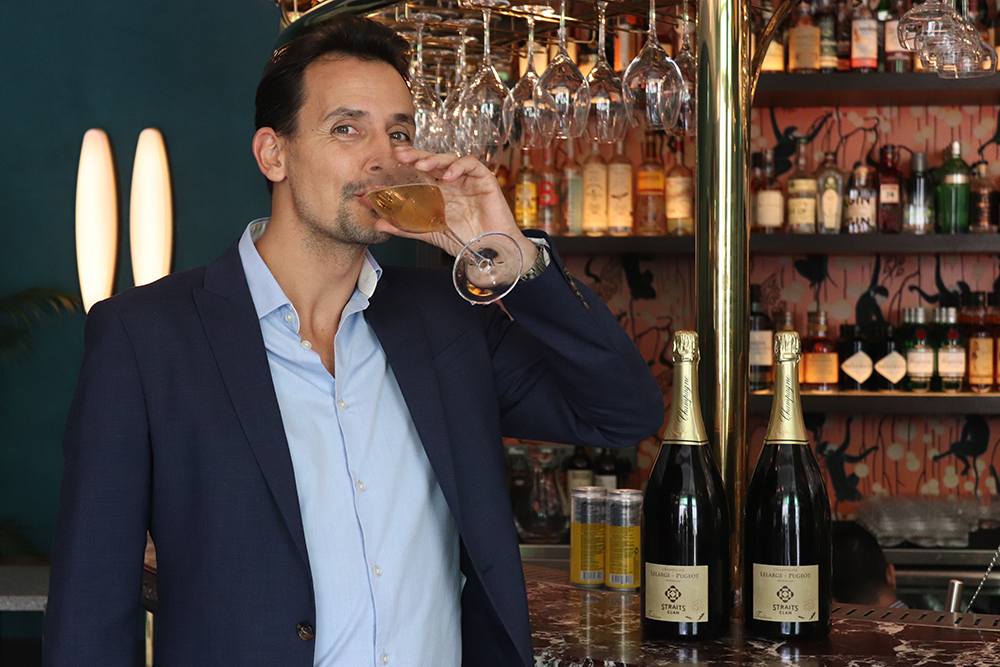Organic and biodynamic wines and champagnes are taking over Asia’s bars and restaurants, and there’s a good reason for that. Not only do they taste exquisite, but they are also sustainable and that’s not even the best part. Did we mention they can be hangover free?
“No hangover, that’s the beauty of it.”
Have we got your attention yet? We thought so. These famous words came from the mouth of our new favorite Frenchman, Julien Moreau-Pernet. Julien is the founder and CEO of Sparkle, an Asia based company that distributes organic and biodynamic champagne, wine, and spirits. Coming from a French family that’s been in wine his whole life, he bore the company from the same deep-rooted belief in the quality of organic products and a proclaimed love for French terroir and savoir-faire.
Sparkle brings together a carefully selected panel of premium organic products – from champagne and wines to fine foods, much of which he found himself while exploring the French Vineyards of Champagne, France. The dedication that Sparkle put into champagne will soon go into spirits as well. Julien and his team are currently increasing their product range with more bio-dynamic wines as well as researching organic spirits like cognac and rum, gin and tequila.
Sparkle also only work with suppliers and partners that are engaged in sustainable and responsible farming, production and social enterprising. Their goal is to help those with limited visibility and access to Asian markets still be able to deliver high-end quality gastronomic products with a long term vision and respect for their environment. They do all this with a glass of biodynamic champagne in their hand. What does this even mean? Good question. We asked Julien below.

GITNB: Why did you divide to get into the business of organic champagne and spirits?
Julien: Look, for me it’s obvious – I’m from France and I love good food and good drink. I’m also from a champagne family and I’ve been drinking and enjoying biodynamic champagne for years. When I came to Singapore I was looking to find the same products that I’m used to at home and to my disappointment, I couldn’t find anything. So I brought them myself. I now also work to make people aware of the extraordinary work that actually goes into this type of wine.
Here is our burning question – can you explain to use what is the difference between organic and biodynamic?
Typically, organic starts from the vineyard. It’s basically a grape which is made from wine without any chemicals. When we move to biodynamic, it’s even more restricted in terms of grades and the number of sulfates and copper used. It also follows the Ecocert’s principles to be certified, which follows more than 200 points of wine, vineyard growing, and wine production.
With bio-dynamic, you will typically see fields of grass, flowers and natural species of flies that prevent the vines from getting sick. It also includes Ecocert’s certification points and on top of that, it also uses homeopathic treatments that help develop the strength of the environment of the vineyard.
What about sustainability? By being on organic champagne or wine, does that mean you are sustainable or is that also an additional certification or process?
Not using chemicals is already what we call sustainable because you improve the quality of the soil. You don’t contaminate your water or your soil so your wine and all your terriors become much more sustainable.
Are there any misconceptions about organic wine that you want to shake?
We would really like to shake the misconception that biodynamic is about only following the lunar calendar – it’s not a voodoo thing. There is a much more certifiable approach. It’s a mix of years and years of agriculture research, years or years of learning about how to treat and cure vines, and years and years – I would say even centuries – of secret recipes which all helps to develop a really fantastic product.
What’s the impact you’re trying to make on people and the planet?
By bringing these types of products, I want to expose people to biodynamic production. Also, I want people to realize that there is a great deal of work that is being done by organic and biodynamic producers not just in champagne but also in the wine community. This work also has a really strong impact on the environment because bio-dynamic production is all about not using chemicals, sulfates, or pesticides – so you basically treating wine and vineyards in a gentle and natural way. In this way, sustainability is very important to wine growers and wine drinkers.
What is one of the more interesting things that you’ve learned in this journey?
Developing this organic and biodynamic range has been a very interesting experiment. We have engaged with a lot of growers and discovered their methodology and especially all the passion that goes into the production, like the heart, soul, and dedication that goes into the soil and grapes. I was also quite surprised to learn that all the technology and methodology that we use today, they’re not new. We’ve been using them for centuries and centuries but we just forgot about them.
What is big your vision for the future of Sparkle?
Our vision is to increase awareness about organic and biodynamic production of wine and champagne and build a community around those concepts so we can increase the organic and bio-dynamic product range in Asia. We also want to help all the growers who have been working hard for many years to develop these processes that develop these high-quality products.
So what kind #LittleGreenSteps do you suggest our readers can employ when looking for organic champagne or wine?
Definitely price, you cannot have high quality with cheap price. Also, don’t be afraid, try new experiences and try new products – you will be surprised.

